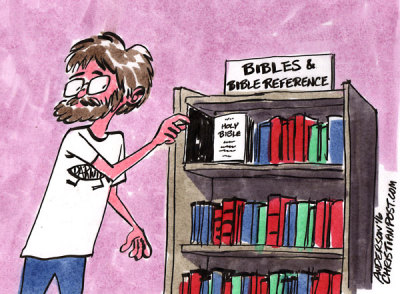Top three reasons people reject Christianity

In my experience, there are three top stumbling blocks or “turn-off’s” of Christianity that I see surface time after time with both non-Christians and believers who struggle in their faith. Although there are certainly other issues that crop up, here are the ones – from least to most problematic – that I’ve seen over and over again.
Unanswered Prayer
Near the end of the movie God’s Not Dead, the atheist college professor who has attacked and ridiculed his Christian student’s faith throughout the film admits that it was his mother’s death from an illness and his unanswered prayers for her healing when he was young that drove him to atheism. When he converses with a pastor who attempts to comfort him, the pastor says that God sometimes says ‘no’ to our prayers. The professor then with anguish utters something that is to me one of the most poignant statements in the film:
“He says no a lot.”
It would be one thing if it was just prayers for new cars, A’s on tests, and a date with the person you want to go out with that seem to go unanswered. But it’s another thing entirely when your soul mate or child has cancer, when you’re the provider of a young family and have been out of work for a long time, or when a loved one seems determined to destroy their life with substance abuse, and no light at the end of the tunnel has appeared despite repeated and deep cries to God for help.
If would also be different if the Bible didn't contain promises from God about Him being a loving Father who sees every need, One who speedily answers His children’s requests, and being a God whose will cannot be thwarted.
But when Scripture speaks about nothing missing God’s attention (Matt. 10:29), says that He rapidly brings about justice for those He loves (Luke 18:6-8), and claims that nothing can prevent Him from doing what He pleases (Job 42:2), unbelievers and Christians alike sometimes wrestle with existentially putting the puzzle pieces together of the difficult and painful things they have lifted to God in prayer and the seeming silence they receive from Heaven.
Such things give pause even to Christian authors such as Philip Yancey who once wondered if prayer was just, “a sanctified form of talking to myself.”
Something Wicked This Way Comes
What do Charles Darwin, Ted Turner, and Bart Ehrman have in common?
Although in different work professions, all have very strong intellects and all admit that the reason they either reject God entirely or are agnostic about His existence is because they can’t square the evil they’ve experienced in their own lives or seen played out on the world’s stage and the idea of a supreme Deity.
For Turner it was watching his young sister die; with Darwin it was the death of his young daughter Annie; for Ehrman it is the general problem of theodicy.
The problem of reconciling an all-powerful/good God with the evil and tragedies that occur in life have caused endless discussions between unbelievers and believers. No thinking person can deny the thorny issue that the topic presents, especially when it’s your child that is accidentally killed or dies slowly from a degenerative disease or when it’s your particular nationality that is systematically hunted down and exterminated by political tyrants.
When evil touches them, people sometimes begin to question God’s existence and begin to believe the atheist option offered by Richard Dawkins for why evil exists: “In a universe of electrons and selfish genes, blind physical forces and genetic replication, some people are going to get hurt, other people are going to get lucky, and you won't find any rhyme or reason in it, nor any justice. The universe that we observe has precisely the properties we should expect if there is, at bottom, no design, no purpose, no evil, no good, nothing but blind pitiless indifference.”
Professing Christians
Only 30% of adults in the United States have a “positive” perception of evangelicals, Barna Group research indicates. Such data appears in line with Gandhi’s famous statement where he declared that He liked Christ but not Christians because their actions don’t mirror those of Jesus.
Christian apologist Ravi Zacharias says that, of all the thousands of questions put to him challenging Christianity, the one question that has bothered him the most was asked by a Hindu friend: “If this conversion you speak about is truly supernatural, then why is it not more evident in the lives of so many Christians that I know?” In other words, a God who is said to transform should produce people with transformed lives.
Make no mistake, we’re not talking so much about the Christian Church as a whole. Try as some do to rewrite history, the evidence of the countless numbers of hospitals, orphanages, schools, disaster and hunger relief organizations, homeless shelters, clothing and basic needs providers, etc., that were founded and continue to be run by Christians provide witness of Christianity’s love towards people and refutes critics in the way Peter described long ago: “For this is the will of God, that by doing good you should put to silence the ignorance of foolish people” (1 Peter 2:15).
No, instead what puts a bad taste in people’s mouths is the individualistic actions of people like the televangelist whose public tears for the poor dries up when allegations of corruption and theft are proven, the professing Christian at the office who maligns and stabs their co-workers in the back, the clergyman who is indicted for child pornography and sex abuse, the business that advertises itself as “Christian owned and operated” but routinely puts out shoddy work, and the church deacon who bullies, cheats on and verbally mistreats his wife.
All Three Throughout the Bible
In the face of these three obstacles to Christianity, I would like to offer something for consideration that I haven’t seen anyone else bring up where these issues are concerned.
Part of the problem with each issue is that they appear to exist in a contradictory manner with what the Bible seems to teach. In essence, people see an existential mismatch between the Bible and life as we experience it. But such thinking is actually incorrect. Stop for a minute and consider…
In the Bible, sometimes the good brother is killed by the bad (Gen. 4:8), famines occur (Gen. 41:27), beloved wives like Rachel die in childbirth (Gen. 35:19), nations are conquered by countries more evil than themselves (Dan. 1:1-2), livelihoods, families, and good health are destroyed by the enemy (Job 1-2), a man who God says is the greatest to ever live is unjustly murdered in prison by an evil woman (Matt. 11:11; 14:1-12), righteous men’s truthful sermons are rejected by a culture that even goes so far as to kill them (Acts 7), some prayers lifted up to spare the life of great Christians are granted (Acts 12:5, 12) while others are not (Acts 12:2).
And let’s not forget the episode of how an innocent, sinless man’s prayer to avoid death seems ignored (Matt. 26:42) and He ends up being traded for a known murderer (Matt. 27:21) and then crucified.
Where the lifestyle of God/Christ followers are concerned, the Bible’s unvarnished exposé of its ‘heroes’ and other professed believers mixes together episodes like Abraham lying about his wife (twice; Gen. 12:13, 20:2), Jacob deceiving his father to get Esau’s blessing (Gen. 27), David committing adultery and then having the woman’s husband killed (2 Sam. 11), with Judas’ betrayal of Jesus (Matt. 26:47-50), the disciples abandoning Jesus (Matt 26:56), Peter’s denial of Jesus (Matt. 26:69-75), John-Mark leaving his missionary companions (Acts 13:13), Demas leaving Paul (2 Tim. 4:10), and more.
Not exactly the sugar coated happily-ever-after’s and squeaky-clean characters you find in children’s fairy tales.
The point is, the existence of evil, not obtaining the outcome of prayer that one desires, and flawed characters of God-followers are found everywhere in the Bible. Scripture actually very much relays – sometimes in stark and unvarnished ways – the seeming unfair reality we walk in each and every day. There is no existential mismatch between it and life.
That being true, what now are we to think? My answer is the alignment of the Bible’s and our reality ought to give us hope. In Scripture, we see God redeeming great good from evil in situations such as where an innocent and sinless man’s prayer for deliverance isn’t answered, his close friend betrays Him, and He becomes what seems to be the tragic victim of evil.
The Bible shows us three days later why all that happened.
In Scripture’s pages we find the answer as to why evil exists and what God is one day going to do about it, why prayer doesn’t work like a vending machine, and why some people who profess Christ aren’t who they claim to be and why those who are true believers sometimes act like they aren’t.
The question is, will we accept those answers? In the end, sometimes it comes down to really walking by faith and not by sight because we can’t see the end of the road like God can.
Tough sledding sometimes? You bet. The key to overcoming these things and more is fixing our eyes on Christ who endured “the big three” issues of Christianity in His life and pressing on through them when they happen to us with hope and trust in a God who is bigger than all of them.
Robin Schumacher is a software executive and Christian apologist who has written many apologetic articles, appeared on nationally syndicated radio programs, and presented at various apologetic events. He holds a Master's in Christian apologetics and a Ph.D. in New Testament.



























